This article was co-authored by Cameron Gibson, R.C.C.. Cameron Gibson is a Registered Clinical Counsellor in Vancouver, British Columbia. Cameron specializes in working with men to support their struggles with anxiety, depression, trauma, OCD, and developmental disabilities. He holds a BA in Psychology from Carleton University and an MA in Counseling Psychology from the City University of Seattle. Cameron is also the Program Director for Manifest Wellness, a men's mental health clinic, where he works to destigmatize mental health support for men and increase access to counseling.
There are 10 references cited in this article, which can be found at the bottom of the page.
This article has been viewed 29,014 times.
Social anxiety can turn a routine interaction into a nerve-wracking ordeal. If you have social anxiety, you might want to hide in your house and avoid talking to people as much as you can. This is actually the wrong approach, though. The only way to get over social anxiety is to face your fears, and that means socializing. You can learn to socialize well, even if your anxiety makes it difficult at first. Start by challenging the negative thought patterns that are holding you back. Then you can practice navigating social situations and having conversations with people.
Steps
Challenging Negative Thought Patterns
-
1Identify your fears. What in particular scares you about social situations? Are you afraid of stuttering, saying something silly, or having nothing to say? Often a generalized sense of fear can be traced back to a more specific root fear.[1]
- Consider when you first felt fear about social situations.
- Consider whether there are any specific types of social situations that are anxiety provoking for you.
-
2Ask yourself if your fears are realistic. Many people with social anxiety have fears that are overblown. Think about whether your anxiety is rooted in reality. Your imagination may be running away with you.[2]
- Many social fears are based on worst-case scenario thinking.
- For instance, if someone you just met cut their conversation with you short, you might immediately fear that they dislike you. Consider whether there are other, more likely explanations. Maybe they remembered they were late for an appointment, or maybe they were in a hurry to pick up their child from school.
Advertisement -
3Challenge your self-perception. Social anxiety can cause you to have distorted thoughts about yourself. Remind yourself that these thoughts aren’t based in reality, and work on replacing them with healthier ideas about yourself.[3]
- For instance, if you catch yourself thinking “I’m a social failure,” change that thought to, “I’m nervous in social situations, but I’m working on developing my skills.” It may also help you to think back to a time when this thought was not true. Try asking a friend or family member to get a different perspective on the thought as well.
-
4Avoid putting too much pressure on yourself. When you don’t go out much, you might feel like every interaction you have is disproportionately important. In reality, any single encounter is not going to make or break other people’s opinion of you. Other people probably pay less attention to you than you think, so don’t put pressure on yourself to be perfect.[4]
- Remember that you don’t have to be perfect to be liked.
-
5Get help. Overriding the natural way you think can be a challenge. Reach out to others for support and accountability as you try to alter your negative thought patterns. Others can offer you a different perspective and help you see when your thoughts are unrealistic.
- Ask a friend for their opinion when you feel yourself getting particularly anxious. Tell the person what thoughts are going through your head and conduct reality-based testing to see if there is any evidence to support your thoughts.
-
6See a professional. Psychotherapy involves working with a trained mental health counselor or therapist to identify the source of your social anxiety and develop strategies to overcome it. A psychotherapist can work with you to restructure your negative thoughts about social situations. A professional can also help you gradually get more exposure to anxiety-provoking events until you start to feel more comfortable.[5]
- It is perfectly fine to see a few therapists when you are looking for one. This will help you to find someone who you feel comfortable talking to.
Surviving Social Situations
-
1Practice socializing regularly. Social anxiety can make you want to hide away from people, but that only makes the problem worse. To get over your anxiety, practice going out and talking to people on a regular basis. It might feel difficult at first, but you will gradually start to relax as you gain experience.[6]
- Start with small interactions, like buying groceries in the regular check-out lane instead of the self-check-out. As you get more comfortable talking to people, work your way up to bigger interactions, like going to parties.
- Try to come up with some topics to discuss when you have an opportunity, such as while waiting in line to buy groceries. Stick to lighter topics such as the weather or local events and steer clear of anything potentially inflammatory, such as politics.
- Keep in mind that the length of the conversation does not matter. Even having a short exchange with someone is good.
-
2Do some research ahead of time. Going into a new situation can feel less intimidating if you have an idea of what to expect. If you’re unfamiliar with a type of social interaction, a Google search can give you some information on how it usually goes.[7]
- For instance, if you’re nervous about going to your first job interview, do some research on interview etiquette and frequently asked interview questions.
- If you are going to a conference, research speakers and companies in advance. Come up with some questions and things to say.
-
3Take deep breaths. If you’re feeling anxious, deep-breathing exercises can help you calm down.[8] Breathe in slowly through your nose for a count of eight, hold it for two seconds, and breathe out for another count of eight.
- Breathing deeply forces your muscles to relax and ensures you get enough oxygen in your blood. Your body tells your brain how to feel, so taking deep breaths will let your brain know that you are okay.
-
4Chat with kids. If there are kids present in a social environment, take a breather and strike up a conversation. In comparison to adults, most kids are much easier to talk to. They don't care much about whether you meet certain social expectations and they may not require you to rush to fill the silence with small talk.
- If you're feeling anxious at a wedding reception or party, go hang out with the kids for a few minutes. Saying "Hi...can I join you guys?" is enough to gain admission to their club.
-
5Focus outward, not inward. Thinking about how nervous you feel can magnify the feeling. Instead, turn your focus outwards. Notice the physical details of your surroundings and the other people in the room.[9]
- For example, when you notice yourself becoming anxious, take stock of your environment. Play a mental game, pointing out to yourself some things that you see that are the color white or blue. You can also try looking for things that are round or square. Doing this uses your sense of sight and pulls your attention away from how you’re feeling to reduce your anxiety. You can also take the attention away from yourself by focusing on your other senses, such as by asking yourself, “What do I hear? See? Smell?”
Practicing Conversational Skills
-
1Stick to open-ended questions and answers. You have probably been in a taxing conversation in which it felt like you were pulling teeth (or were having your teeth pulled) just to get answers. Generally, if you make use of open-ended questions and answers, you can keep a conversation going longer and gain more insight about the other person.[10]
- For example, it might not be a good idea to ask, "How was work?" There's a chance the other person could respond with "fine" and the conversation falls flat. If you ask, "What happened at work that was exciting this week?" there's much more room to expand the conversation.
- The same goes when providing answers. If someone asks you a closed-ended question, challenge yourself to at least offer back a full sentence. For instance, if you are asked "How was work?," respond with "Work was pretty stressful this week." That way the other person has something (i.e. the fact that you were stressed) to keep the conversation alive.
- You can also ask about the person’s interests, favorite ways to spend free time, and good restaurants that they know about.
-
2Think up a few conversation starters ahead of time. If you’re worried about not having anything to say to people, practice a few basic conversation openers ahead of time. Good topics to chat about include the weather, food, work, or school.
- For instance, you could open a conversation by saying, “This weather is so beautiful! It doesn’t feel like November at all,” or, “Have you tried the new burger restaurant down the block? I’ve heard such good things about it.”
- Avoid talking about touchy subjects like religion, politics, or personal issues until you know someone well.
-
3Ask people about themselves. Almost everyone loves to talk about themselves. Being interested in others is a simple, pressure-free way to keep a conversation going.[11]
- Good topics to ask people about include their work, school, and kids. You might say, "Well, hello, Bill. It's been awhile. How are Nancy and the kids? They must be teenagers now!"
- Don’t ask questions that are too personal unless you know somebody well.
-
4Make eye contact. Making eye contact indicates that you’re paying attention to the person you’re talking to. It also gives others the impression that you’re open and trustworthy. Try to match the level of eye contact the other person is giving you.[12]
- The amount of eye contact you should make depends on your culture. In North America and most of Europe, making eye contact is considered polite. However, in Asia, Latin America, Africa, and the Middle East, eye contact can be seen as aggressive, flirtatious, or impolite.[13]
-
5Avoid speaking too softly. Being asked to repeat yourself can be awkward, so work on maintaining a good volume level when you talk to people. If you’re not sure whether you tend to speak too quietly, ask a friend or family member what they think.[14]
- If more than one person has told you to speak up more, you probably need to work on being louder.
References
- ↑ http://www.helpguide.org/articles/anxiety/social-anxiety-disorder-and-social-phobia.htm
- ↑ http://www.calmclinic.com/anxiety/how-to-cure-social-anxiety
- ↑ https://health.clevelandclinic.org/how-to-overcome-social-anxiety/
- ↑ http://www.helpguide.org/articles/relationships/overcoming-loneliness-and-shyness.htm
- ↑ http://psychcentral.com/disorders/social-anxiety-disorder-treatment/
- ↑ http://www.calmclinic.com/anxiety/isolation-loneliness
- ↑ http://www.succeedsocially.com/howtofacefears
- ↑ Cameron Gibson, R.C.C.. Registered Clinical Counsellor & Program Director. Expert Interview. 10 February 2021.
- ↑ https://health.clevelandclinic.org/how-to-overcome-social-anxiety/
- ↑ https://www.anxietycanada.com/articles/conversation-skills/
- ↑ https://www.anxietycanada.com/articles/conversation-skills/
- ↑ http://www.improveyoursocialskills.com/how-to-make-eye-contact
- ↑ https://www.anxietycanada.com/articles/conversation-skills/
- ↑ https://www.anxietycanada.com/articles/conversation-skills/


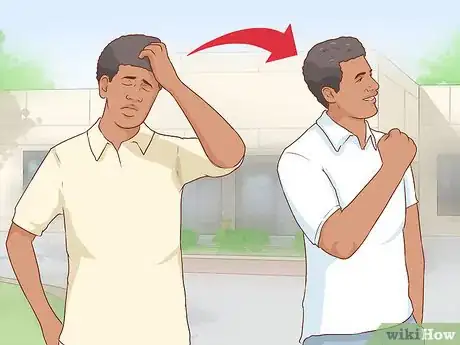

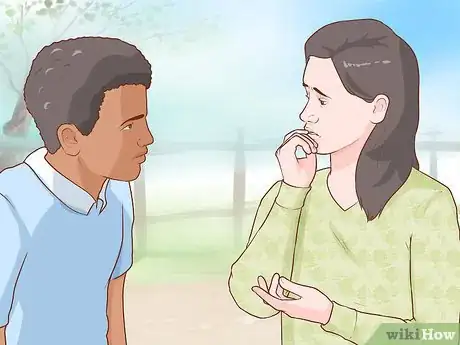


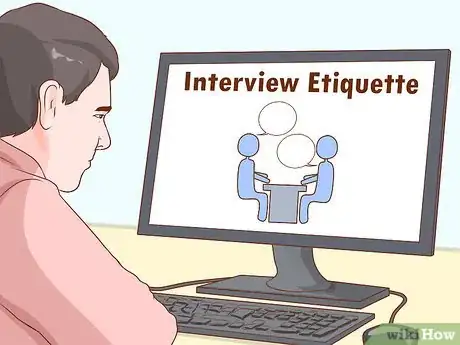



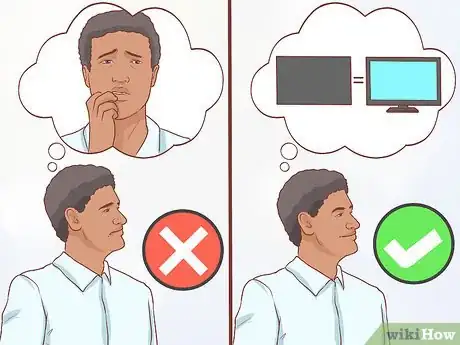



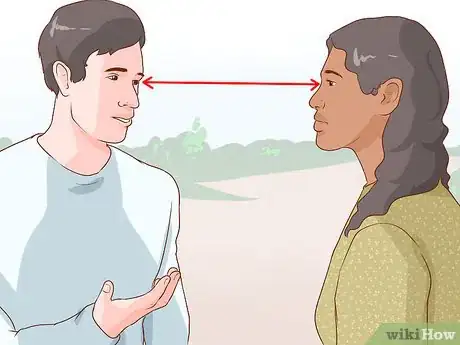
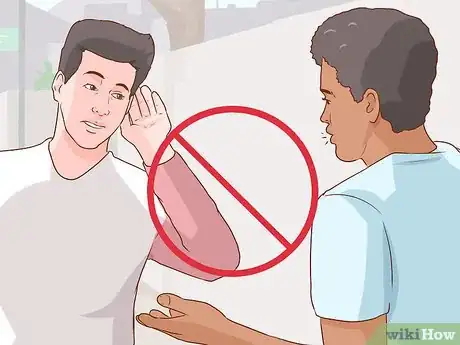



























































Medical Disclaimer
The content of this article is not intended to be a substitute for professional medical advice, examination, diagnosis, or treatment. You should always contact your doctor or other qualified healthcare professional before starting, changing, or stopping any kind of health treatment.
Read More...